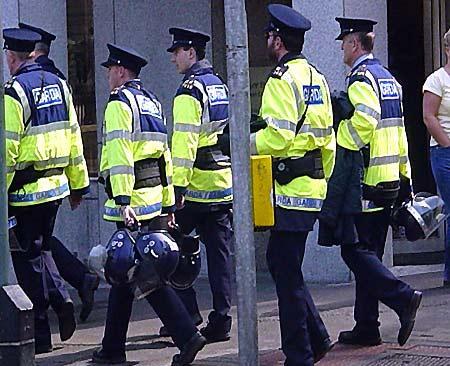Nobody seems to be policing the Garda Siochána

When Kathleen O’Toole goes back to Boston on her holidays, her former colleagues in the Boston Police Department will get great entertainment from her stories about our police force.
At times, they might feel she is winding them up, they will surely find it hard to believe that the Garda Síochána is as chaotic and dilapidated as she has found it to be.
O’Toole is head of the Garda Síochána Inspectorate, which is expected to ‘‘promote excellence and accountability in the Garda Síochána by ensuring that the resources available to the Garda Síochána are used to achieve and maintain the highest level of efficiency and effectiveness in its operation and administration, as measured by reference to best international policing practices’’.
The ‘‘best international practice’’ reference is usually a warning signal for baloney, but it might mean something in this instance.
O’Toole’s most recent report will no doubt have the folks back in Boston breaking their sides laughing when she gets to tell them about it. Best international practice? My eye!
The recruitment of civilians (non-sworn police officers, to use the lingo) to do administrative work in Garda stations has been talked about and promised for about 20 years. As O’Toole noted, most leading police forces comprise at least a third police staff (as distinct from police officers). Here, it is 11 per cent.
Irish police officers get more training than most police officers elsewhere, which is fine. But what is the point of that training if they then spend a large amount of time doing work for which they have not been trained?
‘‘The inspectorate estimates that as many as 1,650 gardaí are required each day to provide administrative services to the public at Garda stations," she said. ‘‘This represents 14 per cent of all members of sergeant and garda rank assigned to divisions."
They will have a great laugh in Boston when they hear about the Garda Reserve. Remember that? It was former justice minister Michael McDowell’s bright idea - and he had lots of them. There are 410 reserves, with 154 in training.
O’Toole was reserved in what she said about the Garda Reserve, but you can read between the lines. ‘‘A crucial consideration is that the role of the Reserve must be closely defined and its members must receive direction and training commensurate with their duties and responsibilities."
In other words, nobody knows what the hell the Garda Reserve does.
In an organisation employing more than 13,000 people, wouldn’t you think that it would be important to know what these people were doing?
Not in the Garda Síochána. ‘‘The Garda Síochána does not have systems in place to routinely collect and analyse workload data for individual units across the organisation," O’Toole said. ‘‘There is no dedicated Garda team or individual responsible for monitoring workload and advising Garda management on deployment."
There is a computer-aided dispatch system in use in parts of the Dublin region which would do the job, but it is not used all the time - even in the places where it is available. This irked O’Toole.
‘‘The absence of data on demands for Garda services is unacceptable, and must be addressed as a priority," she said. ‘‘Such absence is exceptional in modern police services." Sick leave was a problem in the Garda Síochána, she discovered, with an average loss of ten working shifts per member due to sickness.
‘‘Benchmarked against sick leave in other police organisations, an average loss of ten shifts per officer per annum is not in line with best practice," she said. ‘‘For instance, police services in Britain have sick leave levels as low as seven days per officer per annum."
If the average sick leave per officer per annum were reduced by a single day, she said, that would be the equivalent of employing 65 experienced gardaí at no extra cost.
More than three million hours in overtime were clocked up in 2007, the equivalent of adding 1,737 extra gardaí to the organisation. Much of this arose from attendance in court We have known about this for years, but nothing has been done about it apparently.
Among the revelations which the lads back in Boston will find unbelievable is that Garda stations have far too many computers, but they are stand-alone personal computers without internet access.
There are - wait for it - no email facilities in Garda stations. No GPS systems. No facility for knowing where Garda cars are at any time.
The rostering of gardaí has little regard for the varying demand for Garda services. Gardaí are busiest between 8pm and 10pm in metropolitan areas and least in demand from 4am to 6am but, apparently, in many instances, the same number of gardaí are on duty at these times.
If there were a Garda Authority and evidence of such spectacular incompetence became available, there would be demands for the sacking of the authority. How is it then that Ministers for Justice, who act in place of an authority (at their own insistence), are not routinely sacked - or is just that this is how the system works?
Dan O’Toole, another retired Boston police officer who is over here with his wife, must surely be promising: ‘‘I’ll take you home again, Kathleen".
